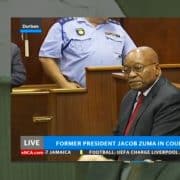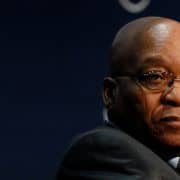|
Getting your Trinity Audio player ready...
|
At the beginning of March the bench of the Pretoria High Court, comprising Deputy Judge President Aubrey Ledwaba, Judge Billy Mothle and Judge Cynthia Pretorius, heard arguments in a case brought by the DA, calling for a review of the decision in 2009 to withdraw corruption charges against Jacob Zuma. The court handed down a biting judgment today, finding that the decision, made by former acting national director of public prosecutions Mokotedi Mpshe, was irrational and should be reviewed and set aside.
The judgment was handed down in the collective name of the court, and was not attached to any of the three judges.
Previously Kemp J Kemp, Zuma’s advocate, described the DA’s case as “going nowhere, stillborn and desperate.” But the court found otherwise.
“This is a great victory, which shows that the rule of law still stands,” said DA leader Mmusi Maimane when court was adjourned. “We are deeply delighted and we welcome the judgment. We’ve always maintained that the decision was irrational and Jacob Zuma must have what he’s always wanted – his day in court.”
If Zuma does not appeal the judgment, the National Prosecuting Authority (NPA) will now have to decide whether to reinstate the charges or not.
No link between conspiracy and the decision to drop charges
The DA’s case is part of a complicated saga involving a supposed political conspiracy against Zuma by former president Thabo Mbeki and others, a bundle of material known as the spy tapes, and 18 charges of fraud and corruption, relating to 783 dodgy payments in the arms deal scandal, against Zuma. The DA asked the court to reconsider the rationale behind the withdrawal of charges, which were dropped just weeks before Zuma took the oath of office for the first time, and to set aside the decision.
The so-called spy tapes are said to contain evidence of the conspiracy – and are the grounds on which Mpshe decided to drop the corruption charges. This despite the fact that “the prosecution team and deputies were of the view that prosecution should continue”, the court held. “The prosecution team itself recommended that prosecution continued, and that it should be left to a court of law to decide whether to stop prosecution.”
The DA had won its battle to obtain the tapes, their transcripts and related documentation in 2013, and based its case on its belief that the tapes contain enough information to warrant an application to review Mpshe’s decision. The NPA was ordered in August 2013 to provide the DA with the tapes, a judgment that Zuma appealed and lost. The tapes were finally released in 2014.
The NPA put up a determined defence in the latest round, saying that even if it is found that Mpshe made the wrong decision, it was his mistake to make and that he had properly exercised his discretion. “You may not like it. I may not like it,” said Kemp, “but you cannot say that the reaction or reason is irrational.”
But, Ledwaba said while reading the judgment, if the conspiratorial allegations were true, the decision to drop charges should have been made by a court of law. In not using that avenue of recourse, instead relying on untested claims of political interference, Mpshe rendered his decision irrational.
“The consequence of failing to refer this decision to a court shows that the decision was irrational,” said Ledwaba.
And by offering three different versions of the reason for his decision, Mpshe did not help his case. Furthermore, by succumbing to pressure from Zuma’s legal representatives, Mpshe ignored his oath of office that required him to act independently and apply his mind without fear or favour. Zuma should face the corruption charges, the court held.
“It is thus our view that the envisaged prosecution against Mr Zuma was not tainted … Mr Zuma should face the charges as outlined in the indictment,” said Ledwaba.
The respondents were ordered to pay costs.
Background to the spy tapes saga
In mid-2013 we reported that the tapes were said by the NPA to be recordings of alleged conversations between the two men who headed the now-defunct Scorpions and the NPA, Leonard McCarthy and Bulelani Ngcuka respectively, at the time when charges were brought against Zuma for his involvement in the controversial arms deal.
Those charges stemmed from evidence that came out of the corruption and fraud trial of Durban businessman Schabir Shaik, Zuma’s former financial adviser. At the time that Zuma and Shaik had a business relationship, the former was the KwaZulu-Natal MEC for economic affairs and tourism. By the time he was charged, however, he was the deputy president of the country. He faced over 700 charges in total, relating to corruption, fraud, money laundering and racketeering.
In 2009, two weeks before the ballot for South Africa’s third democratically elected president – which Zuma won – the NPA suddenly dropped the charges against him in an announcement made by Mpshe.
Zuma had been charged two years previously, after the 2005 conviction of Shaik, who is now on medical parole.
Alleged political manoeuvring sinks corruption case
When he dropped the charges, Mpshe said that the decision was based on recorded conversations between McCarthy and Ngcuka, in which the two men allegedly exchanged details of how the timing was imperative for bringing Zuma down politically, implying that he was a threat to then president Thabo Mbeki, and that political interference played a role in Zuma being brought to account on the corruption charges. Mbeki had removed Zuma as his deputy in 2005 after the Shaik conviction.
But the court held that there was “no rational link” between McCarthy’s alleged misconduct and Mpshe’s decision to discontinue the prosecution against Zuma, nor was it ever explained how the timing of prosecution would adversely affect Zuma. The court did find that McCarthy’s actions constituted “a serious breach of law and prosecutor conduct” – if proven.
The DA’s long fight
Western Cape premier Helen Zille wrote in the Cape Argus newspaper in August 2013 that the order of the North Gauteng High Court to release the tapes was a “decisive moment in a case that has dragged on for four years, through three hearings (so far) and has cost the DA millions”.
Zille argued that the NPA has never explained to South Africans how the tapes show a political conspiracy against Zuma, or why it deemed the case unworthy to go ahead. “We [brought the case] because we believe that it is essential for the NPA to give credible and rational reasons for dropping charges against politically powerful people.”
But the DA also believes today’s judgment is not the end of the fight. Whoever emerges as the loser this time around would likely take the matter to the Supreme Court of Appeal and if necessary, the Constitutional Court, said James Selfe, chairperson of the DA’s federal executive, earlier in April.
“Ultimately the time and the cost is necessary to remind the president, the NPA and South Africa as a whole, that every decision to prosecute or not to prosecute must be made without fear or favour, and that even number one is not above the law,” he said, speaking to News24.








